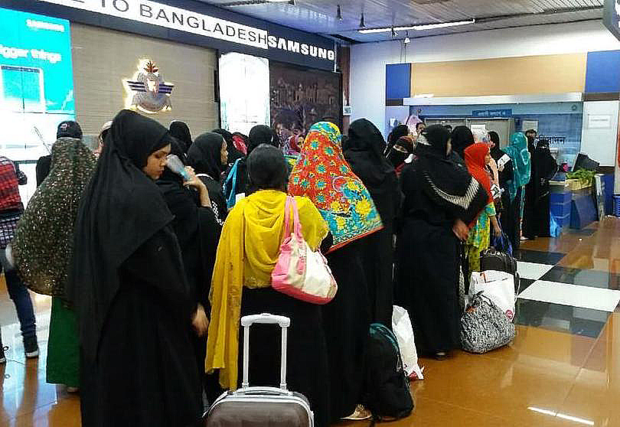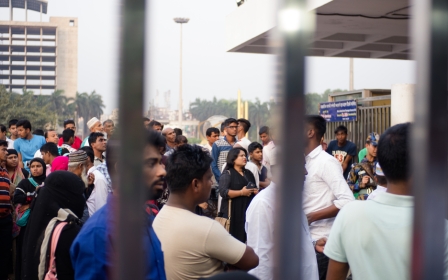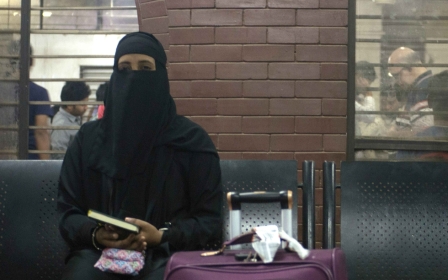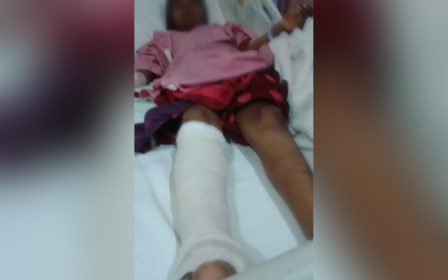Bangladeshi embassy workers in Saudi accused of abusing tortured maids

The Bangladeshi embassy in Saudi Arabia has suspended two workers accused of abusing women who had fled to the embassy-run shelter in Jeddah after being tortured by their Saudi employers.
Local authorities took action after an abuse victim, who had been working as a maid in Saudi Arabia, tried to kill herself at Dhaka airport in Bangladesh last week.
The tortured maid attempted to kill herself by swallowing insecticide inside a toilet in Dhaka airport, according to official Bangladeshi police documents seen by Middle East Eye.
According to the documents, fellow abuse victims who accompanied the woman from the safe house in Saudi Arabia intervened, alongside airport cleaning staff, to stop the woman from killing herself.
Airport police officers interviewed the woman and then filed a case against four employees of the Bangladeshi embassy in Saudi Arabia, accusing them of directly contributing to her desire to take her own life.
Bangladeshi police detained the woman, who remains in detention because killing oneself is a crime in the country.
Aid workers familiar with the incident said the woman attempted suicide after an embassy employee promised to marry her and expedite her repatriation to Bangladesh in exchange for sexual favours.
This suicide attempt should be a wake-up call for the authorities to act
- Shariful Hasan, Head of BRAC Migration programme
Female workers who have returned to Bangladesh from the safe houses told aid workers that four male employees were involved in exploiting women, also promising to help them in exchange for sexual favours.
They told aid workers that the abuse took place regularly in the safe house and lasted for several months, with the employees moving from one victim to another. Aid workers added that the employees who perpetrated the abuse were reported to be Bangladeshi drivers and porters who worked for the embassy.
"These women are in an incredibly vulnerable state when they come to the safe houses. The most they deserve is knowing they will be safe from further exploitation," Shariful Hasan, head of the BRAC Migration programme, told Middle East Eye on Tuesday.
"The abusers told women that if they give sexual favours, then they will go home in one week, and later get married when in Bangladesh.
"But any of these women were afraid to speak out while in Saudi and complain to the Bangladeshi embassy because they wanted to come home so badly.
"We have heard about these incidents from returnees who have suffered incredibly, but this suicide attempt should be a wake-up call for the authorities to act."
Bangladesh set up safe houses inside Saudi Arabia in 2015 in a bid to protect hundreds of women at risk of facing sexual and physical abuse at the hands of their Saudi employers.
Leaked diplomatic cables seen by MEE earlier this year showed that the safe houses were built after up to four women a day were seeking refuge at the embassy.
The repatriation of abuse victims takes several months, meaning the women wait for a prolonged period before going home.
Those that do come home, however, face the stigma of being victims of sexual abuse, with some rejected by their families, forcing them to become homeless or live in safe houses sponsored by local NGOs.
Rothna Begum, senior women's rights researcher at Human Rights Watch, told MEE that the Bangladeshi authorities must create safeguards and reporting mechanisms for abuse victims to report any issues they face inside the safe houses.
"This is what happens when women are not told what their options are once they flee abusive employers. Rather than turning to a driver, the women should be able to approach embassy staff to discuss their options, and be given the support they rightfully deserve," said Begum.
"Part of the problem is that we are seeing no mechanism for the women to complain when inside the shelters. There is this level of impunity due to a lack of complaint procedures."
The Bangladeshi embassy in Riyadh said on Monday that it planned to launch a committee to look into creating a "neutral investigation into the allegations".
"If the allegations are true, those responsible will be sued and terminated from the jobs," Bangladesh's ambassador to Saudi Arabia Golam Moshi said in the statement, according to Bangladeshi outlet Daily Star.
Begum highlighted that this would not be the first time embassy staff of a foreign country in the Gulf would have abused victims of torture.
In 2013, Filipino embassy workers in Kuwait and Saudi Arabia were accused of demanding sex from abuse victims in exchange for paying the cost of their flight tickets back to the Philippines.
The scandal led the Philippine authorities to deploy female diplomatic officials to its embassies at the time in a bid to impose safeguards to stop the abuse.
This article is available in French on Middle East Eye French edition.
New MEE newsletter: Jerusalem Dispatch
Sign up to get the latest insights and analysis on Israel-Palestine, alongside Turkey Unpacked and other MEE newsletters
Middle East Eye delivers independent and unrivalled coverage and analysis of the Middle East, North Africa and beyond. To learn more about republishing this content and the associated fees, please fill out this form. More about MEE can be found here.




